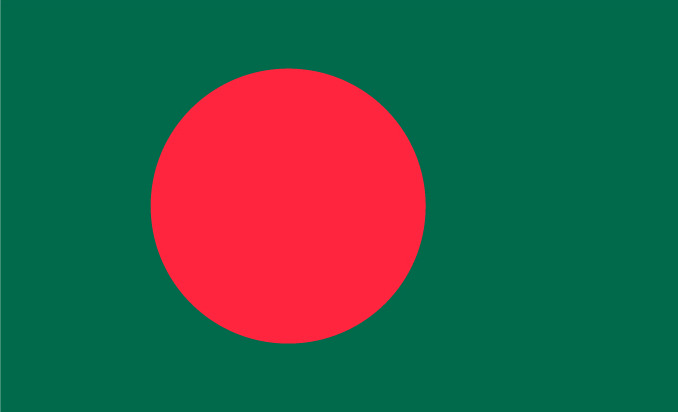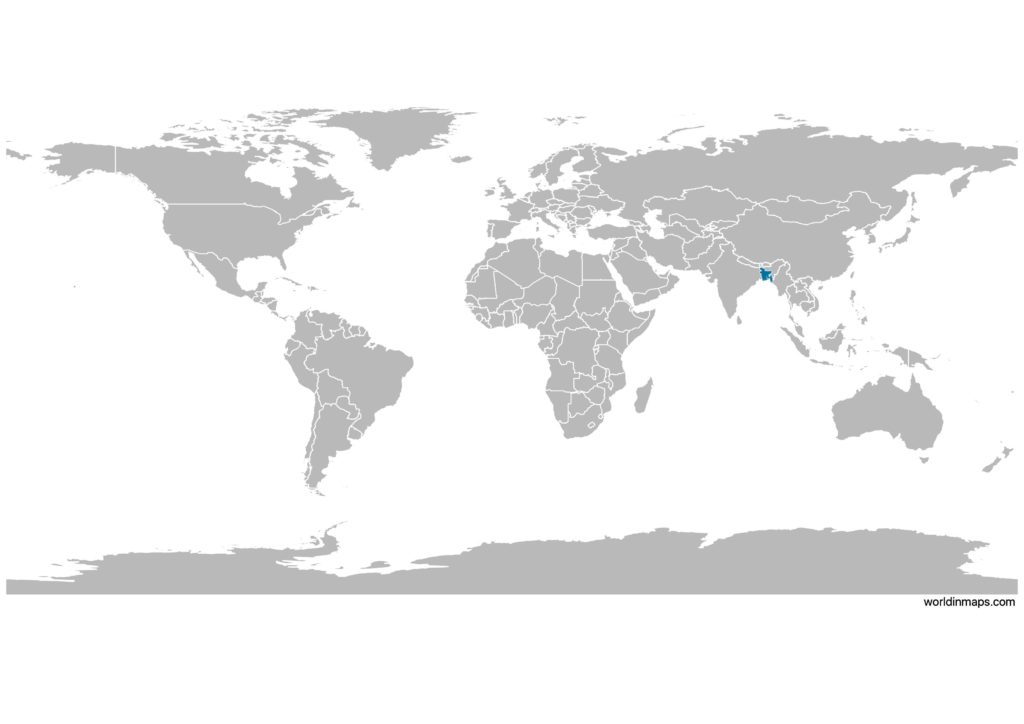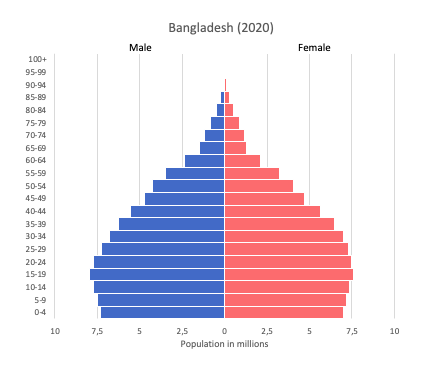Bangladesh

| Government | |
| Name | People’s Republic of Bangladesh |
| Bengali | গণপ্রজাতন্ত্রী বাংলাদেশ Gônoprojatontri Bangladesh |
| Government type | Parliamentary republic |
| Capital | Dhaka (8,906,039 (2011)) |
| Currency | Bangladeshi taka (BDT) |
| Organization | |
| Member State | South Asian Association for Regional Cooperation (SAARC) Commonwealth of Nations |
| People | |
| Population (2020) | 164,689,383 (8th) |
| Density of population | 1,106 P/km2 (7th) |
| Nationality | Bangladeshi |
| Official languages | |
| Bangla (also known as Bengali) | |
| Ethnic groups (2011) | |
| Bengali | 98% |
| Minorities | 2% |
| Religion (2013) | |
| Muslim | 89.1% |
| Hindu | 10% |
| Other | 0.9% |
| Life expectancy (2020) | |
| Male | 72 years |
| Female | 76.5 years |
| Total population | 74.2 years (133th) |
| Homicides | |
| Total (2018) | 2.4 per 100,000 people (96th) |
| Geography | |
| Land area | 130,170 km2 |
| water area | 18,290 km2 |
| total area | 148,460 km2 (95th) |
| Mean elevation | 85 m |
| Lowest point | |
| Indian Ocean | 0 m |
| Highest point | |
| Keokradong | 1,230 m |
| Land use (2016) | |
| Agricultural land | 70.1% |
| Arable land | 59% |
| Permanent crops | 6.5% |
| Permanent pasture | 4.6% |
| Forest | 11.1% |
| Other | 18.8% |
| Urbanization | |
| Urban population (2020) | 38.2% |
| Rate of urbanization | 3.17% annual rate of change (2015 – 2020) |
| Economy | |
| Labor force (2017) note: extensive migration of labor to Saudi Arabia, Kuwait, UAE, Oman, Qatar and Malaysia | 66.64 million (7th) |
| Agriculture | 42.7% |
| Industry | 20.5% |
| Services | 36.9% |
| Unemployment rate (2017) note: About 40% of the population is underemployed; many counted as employed work only a few hours a week and at low wages | 4.4% (58th) |
| GDP (PPP) (estimate 2020) | |
| Total | $917.805 billion (29th) |
| Per capita | $5,453 (136th) |
| GDP (nominal) (estimate 2020) | |
| Total | $347.991 billion (39th) |
| Per capita | $2,067 (143th) |
| GDP by sector (estimate 2017) | |
| Agriculture | 14.2% |
| Industry | 29.3% |
| Services | 56.5% |
| Exports (2017) | $35.3 billion (57th) |
| Exports partners (2017) | |
| Germany | 12.9% |
| US | 12.2% |
| UK | 8.7% |
| Spain | 5.3% |
| France | 5.1% |
| Italy | 4.1% |
| Imports (2017) | $47.56 billion (56th) |
| Imports partners (2017) | |
| China | 21.9% |
| India | 15.3% |
| Singapore | 5.7% |
Bangladesh on the world map

Bangladesh top 10 largest cities (2011)
- Dhaka (8,906,039)
- Chittagong (2,592,439)
- Khulna (664,728)
- Sylhet (526,412)
- Rajshahi (451,425)
- Tongi (406,420)
- Bogra (400,983)
- Mymensingh (389,918)
- Barisal (339,308)
- Rangpur (307,053)
Demography
Population pyramid

Age structure data
Estimate for 2020:
- 0-14 years: 26.48% (male 21,918,651/female 21,158,574)
- 15-24 years: 18.56% (male 15,186,470/female 15,001,950)
- 25-54 years: 40.72% (male 31,694,267/female 34,535,643)
- 55-64 years: 7.41% (male 5,941,825/female 6,115,856)
- 65 years and over: 6.82% (male 5,218,206/female 5,879,411) (2020 est.)
Remark: the age structure of a population affects a nation’s key socioeconomic issues. Countries with young populations (high percentage under age 15) need to invest more in schools, while countries with older populations (high percentage ages 65 and over) need to invest more in the health sector. The age structure can also be used to help predict potential political issues. For example, the rapid growth of a young adult population unable to find employment can lead to unrest.
Population from 1950 to 2020
Source: United Nations, Department of Economic and Social Affairs, Population Division (2019). World Population Prospects 2019, Online Edition. Rev. 1.
Evolution of the life expectancy from 1960 to 2018
Source: World Development Indicators, The World Bank
Economy
Agriculture:
rice, jute, tea, wheat, sugarcane, potatoes, tobacco, pulses, oilseeds, spices, fruit, beef, milk, poultry
Industries:
jute, cotton, garments, paper, leather, fertilizer, iron and steel, cement, petroleum products, tobacco, pharmaceuticals, ceramics, tea, salt, sugar, edible oils, soap and detergent, fabricated metal products, electricity, natural gas
Exports – commodities:
garments, knitwear, agricultural products, frozen food (fish and seafood), jute and jute goods, leather
Imports – commodities:
cotton, machinery and equipment, chemicals, iron and steel, foodstuffs
Time zone and current time in Bangladesh
Go to our interactive map to get the current time in Bangladesh